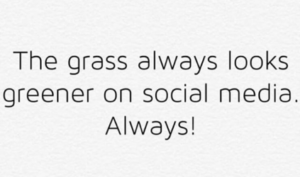Try a Play on Words (Aka the Joy of Wordplay)
Episode #8 of the course Humor boosters: Lighten and tighten your writing by Gay Merrill
Have you come across any writing that uses the rule of three, exaggeration, or comical comparisons using a simile? Yes. Great! (No. Okay, keep looking.)
The cliché is back in this lesson as part of a technique involving wordplay. By definition, a cliché is an overused expression. The expression was clever once but has become so overused it has lost its impact.
You can use clichés to comical advantage by twisting them or using what the authors of Comedy Writing Secrets call reforming. Take a well-known expression, idiom, piece of advice (aka a proverb), or phrase and change the ending to something unexpected. You can also change the words within these widely known sayings provided you retain some of the original words and structure.
Here’s how comedian (and fellow Canadian) Jim Carrey twisted the idiom “Behind every great man is a great woman”.
“Behind every great man is a woman rolling her eyes.”—Jim Carrey
Notice in Jim Carrey’s version he switched the ending to create the humor, which only works because most people are familiar with the original idiom.
Here’s another example of a poster I saw on Facebook that uses this wordplay technique. Can you guess which well-known proverb it’s based on?
This poster is based on twisting the proverb “The grass is always greener on the other side of the fence”.
And the same proverb was the basis of another twist used on the back cover of a memoir on surgical history that I proofread:
“The bedsheets are always whiter on the other side of the curtain.”
What makes this last version work is it retains the key parts of the original proverb. The word grass is swapped with bedsheets, greener is swapped with white, and the fence is swapped with the curtain. (So clever. I wish I’d come up with it.)
I did, however, come up with the following sentence to describe my proofreading skills by twisting the words “across a crowded room”:
“I can spot a missing comma across a crowded page.”
Here’s another example from the blog post “How to Get Started with Video Content Marketing” on the Top Rank Marketing website:
“Don’t practice random acts of video.”
You can expand this wordplay technique to twist other well-known items such as book titles, song titles or lyrics, slogans, or catchphrases to name a few. The essence of the humor is to base your wordplay on widely recognizable phrases and terms.
I’ve come across this form of wordplay often in book and chapter titles, which helps add a humorous tone, for example, these two books on grammar:
• The Joy of Syntax: A Simple Guide to All the Grammar You Know You Should Know by June Casagrande
• Kiss My Asterisk: A Feisty Guide to Grammar and Punctuation by Jenny Baranick
If you peek inside Jenny Baranick’s book, you’ll find fun chapters like these:
• Goldilocks and the Three Bars: En Dashes, Em Dashes, and Hyphens
• The Scarlet Punctuation Mark: The Ellipsis
• Textual Healing: Proofreading
Do you recognize the origins of these titles?
Scott Martin used wordplay to title this article on the Crazy Egg blog: “Let Me Press Your Buttons: 6 Rules for Clickable CTA Buttons”.
As my examples show, you can use wordplay to add fun within your writing or to create a title. Think of a well-known expression and change part of it to give it a twist. To have the best impact, add the twist to the end of the expression. What’s important is to keep some elements of the original expression so people recognize it.
Exercise
Twist a cliché. Choose one or more of the following clichés or find one of your own:
• The acorn doesn’t fall far from the tree.
• Actions speak louder than words.
• All dressed up and nowhere to go.
• Be it ever so humble there’s no place like home.
• Beauty is in the eye of the beholder.
• Give them an inch, and they’ll take a mile.
• People who live in glass houses shouldn’t throw stones.
• Slow and steady wins the race.
I’ve added bold to highlight words you might consider changing. Keep practicing until you come up with one you like.
The next lesson will help you whittle your words, which is critical to creating humorous impact.
Recommended book
Comedy Writing Secrets by Mark Shatz and Mel Helitzer
Share with friends



